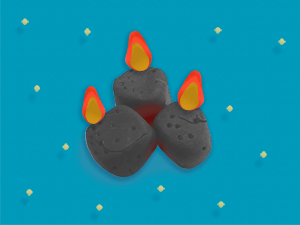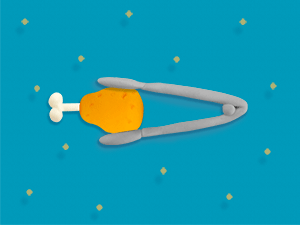Nothing spoils summer like Pink Chicken
Food poisoning can wreck your summer barbecue. Keep pink chicken – and nasty food bugs – off the menu.
Don’t let Pink Chicken spoil yours!
Pink Chicken loves nothing more than to spoil our summer fun, but don’t let him get away with it! Follow these barbecuing steps to avoid picking up any nasty food poisoning bugs and rid Pink Chicken from Scotland’s barbecues.
Don’t let the food bugs bite
- Campylobacter is a bug commonly found in chicken – cooking chicken kills it off properly.
- Approximately 6,000 Campylobacter cases were reported in Scotland last year, but the real number could be far higher than that.
- It’s the most common cause of bacterial food poisoning
- It can be serious. Yet food poisoning isn’t regarded as a worry for three quarters of people in Scotland.
- Campylobacter poisoning can cause diarrhoea, abdominal pain and fever. Some may vomit or experience nausea. It can result in serious illnesses, like irritable bowel syndrome (IBS) and reactive arthritis. In rare cases it can lead to Guillain-Barré syndrome, a serious condition of the nervous system. At its worst, campylobacter can kill.
- Don’t let pink chicken spoil your summer. Prepare and cook chicken properly.
 Cooking
Cooking
Check chicken is steaming hot right through before dishing up.
- Looks can deceive. Charred chicken on the outside may still be pink inside. Check it’s cooked right through.
- Turning chicken regularly helps it cook evenly. And you’ll impress your guests with your fancy tongs action (Remember to use separate tongs for raw and cooked food).
- You’re good to go when the chicken is steaming hot in the middle, there’s no pink chicken to be seen and the juices run clear.
Remember - To make sure the meat is cooked, use a food thermometer. Chicken should be a minimum of 75 °C in the centre.

Size matters. So does your cut of chicken and if it has any bones or not.
- Chicken with bones, like thighs and drumsticks, take longer to cook. Patience will be rewarded.
- The bigger the piece of chicken, the more time it needs.
- Cook clever. Put the larger pieces on to cook first and keep an eye on their progress.
Top Tip
Oven cook chicken first, then pop on the barbecue to be sure it’s cooked through. It’ll taste just as good.

Easy tiger. Wait for the flames to die down and charcoal barbecue coals to glow red with a powdery grey surface before you start cooking.
- Why? Because red hot coals mean the heat gets right into the chicken and doesn’t just char the surface.
- Keep turning the chicken and move it around on the BBQ to make sure it’s cooked evenly – some parts of the BBQ might be hotter than others.
Top Tip
Got a disposable barbecue? The meat often sits close to the flames, so it can look cooked but inside may still be harbouring harmful bugs.
Food prep

Nasty bugs in raw chicken, like Campylobacter, can cause food poisoning.
- Raid the kitchen for separate tongs, utensils and plates to use for raw and for cooked chicken.
- Don’t lift cooked chicken from the barbecue using the same tongs you used for moving raw chicken.

Bugs hate soap.
- So wash hands, utensils and chopping boards regularly in hot, soapy water, particularly after contact with raw chicken.
Top Tip
Wash tools and equipment straight after you use them, so they can’t be accidentally re-used.
Stop the spread
- Don’t spread bugs when using a marinade. Marinades should never be used on cooked meat after it has been used with raw and whilst you have food marinating keep it in the fridge covered or in a sealed container.
- Anything ready to eat, like salad, will be much safer without the added bacteria. So keep it well away from raw chicken.
- Don’t wash raw chicken under the tap, this causes bacteria to spread around the kitchen.
- Keep hot food hot and cold food cold until you are ready to eat.
Top Tip
Prepare salads before you touch raw chicken. Keep uncooked and ready-to-eat foods in separate, sealed containers and keep cold until required.
Food safety
Food safety isn't just about eating out, it's about keeping you and your family safe in the home too.